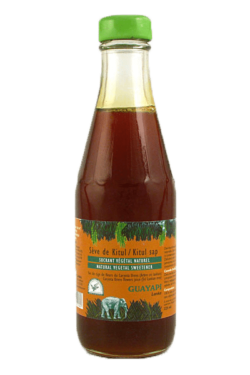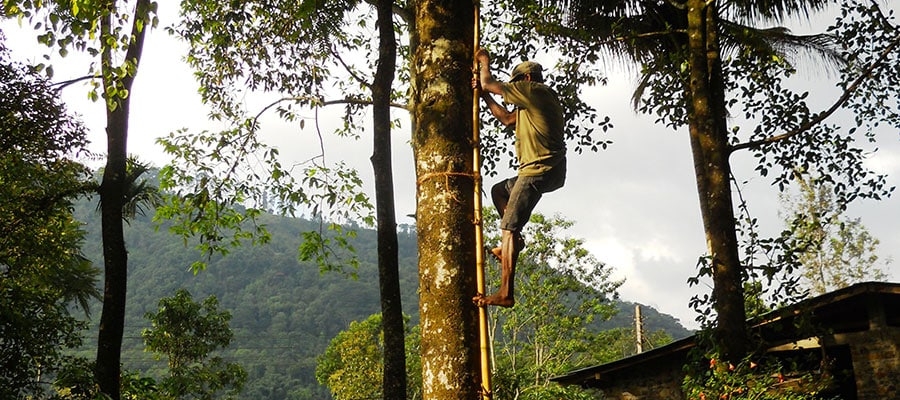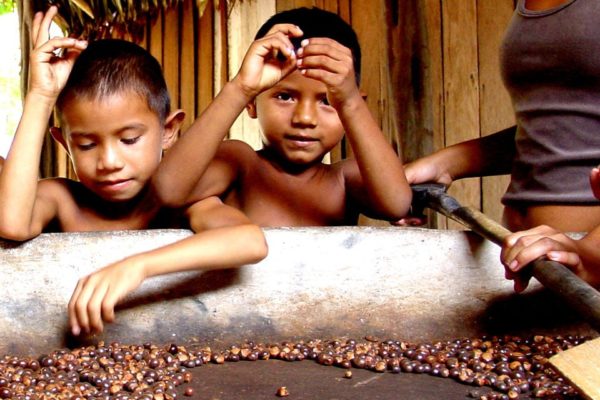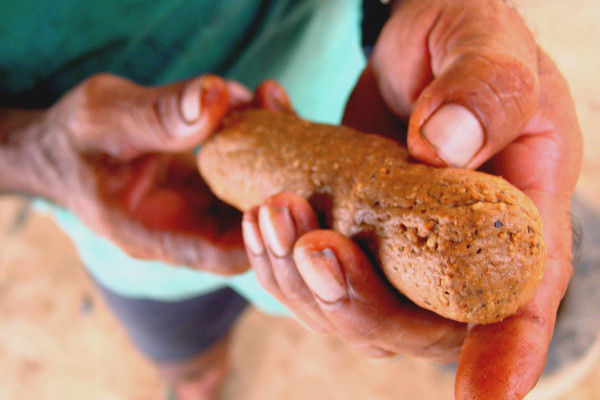The Kitul sap from our Sri Lankan forest gardens
Kitul sap has a low glycemic index (48). Precisely, it contains the three sugars in very small quantities (balance between glucose, fructose and sucrose). This phenomenon, rare in the organic world, has been characterized by scientific literature as “inverted sugar”. Traditional Ayurvedic doctors therefore advise people who cannot consume sugar to taste Kitul Sap because it has no effect on the body.
The Kitul, Caryota Urens, is a palm tree with large and beautiful flowers growing in Sri Lanka.
The process of harvesting and preparing the Kitul sap is over 2000 years old and requires a rare know-how: after climbing the palm tree, the harvester incises the bark and puts spices, chillies, lemongrass … According to a ritual that should encourage the flower to give more juice. 48 hours later, he cuts off the flower stems whose sap is beginning to drip. Filtered, heated, it is finally cooked until a brown juice is obtained. 3.5 liters of sap give a 325ml bottle of final product.
Kitul sap has a low glycemic index (48). Precisely, it contains the three sugars in very small quantities (balance between glucose, fructose and sucrose). This phenomenon, rare in the organic world, has been characterized by scientific literature as “inverted sugar”. Traditional Ayurvedic doctors therefore advise people who cannot consume sugar to taste Kitul Sap because it has no effect on the body.
Guayapi ‘s Kitul sap comes from the forest gardens of a true biodiverse reserve in the Halpola region in Sri Lanka.
The entire production of this land, and that of the 31 small producers in the surrounding area, is certified by Forest Garden Products (FGP), which means that no pesticides or chemical treatments have been used, but also that it respects biodiversity, ecosystems, people and their traditional manufacturing processes. Production is carried out in a natural, protected and biodiversified environment that respects fair trade.
This allows small producers in the region to preserve the Kitul sap which is in potential danger of extinction. Indeed, the traditional and ancestral method of preparation is being lost. As a sweet product, Kitul Sap is coveted by large companies in the sugar industry. These large companies, wishing to “popularize” this product and obtain it at low prices by often adding some sugar cane on it …
To fight against this and to promote the prestige of the Kitul harvesting profession, the Slow Food movement has elected the Sap of Kitul as the Ark of Taste. This delicious caramelized sap can be topped with fruit salads, cottage cheese and all kinds of desserts, but it can also be used in pastries.
For more information: www.ecolanka.com / www.slowfood.com
Warana: a traditional preparation according to ancestral methods
Guayapi markets a wild harvested warana, from the original lands of this plant, stamped “satere mawe”.
This is the name of the tribe from the amazon in brazil living on these lands and producing a warana (guarana appellation of origin) of exceptional quality, thanks on the one hand to the quality of the land and its environment and on the other hand to the traditional methods used.
After harvesting, the stone is stripped of its husk and peeled, dried at low temperature in clay ovens, then fumigated for several weeks over Murici wood, which gives it its exceptional flavour and scent.
The Sateré Mawé Indigenous People consider themselves to be the “Sons of Warana”, discoverers of the virtues of the plant. These people are self-governed in order to maintain a real autonomy and to perpetuate their traditions.
The sale of each Guayapi product contributes to finance the tribe’s infrastructure and create an array of social projects. This helps to improve the local living conditions of the Sateré Mawé people. The company applies a fair and explained price, set by the Consortium of Sateré Mawé Producers (CPSM), according to the principles of fair trade.
The Warana Project offers the Sateré Mawé Nation a further guarantee for the protection of their heritage bequeathed by its ancestors and a existence of dignity for its descendants.
The revenue from the selling of raw products is distributed among the different actors of the chain, from production to marketing, according to the principles of fair trade. The Warana project has given rise to several other ethno-development projects ( as like waste sorting, “bee” project, differentiated culture and differentiated education, etc.).
For more information, please visit the Consorcium des Producteurs Sateré Mawé (CPSM) website: www.nusoken.com
Or consult our files on ethics: https://issuu.com/guayapi/docs/guayapi_dossierethique_2019
Répartition du prix chez les producteurs pour 1kg de Warana
| Prix d'achat aux producteurs de la quantité de Warana en graines séchées au four en argile nécessaire à la production d’un kilo de Warana | 21.73 € | 43.46 % |
| Dépenses directes du Consortium pour la transformation et le conditionnement de la matière première, l’organisation de l’entreprise sociale et l’appui à l’auto-organisation communautaire | 11.42 € | 22.84 % |
| Capitalisation et investissements productifs | 1.70 € | 3.40% |
| Transport des graines des lieux de production à l’atelier de transformation et de stockage, puis de la poudre au port de Manaus pour l’exportation | 4 € | 8% |
| APA ; accès au partage des avantages, rémunération de la transmission de la connaissance culturelle | 1.50 € | 3% |
| Appui au Conseil Général de la Tribu Sateré Mawé pour la réalisation de toute activité nécessaire au soutien de l’ethno-développement | 2.50 € | 5% |
| Promotion de l’image du projet, formation générale des cadres dirigeants, évaluation de l’impact des partenariats publics et privés, consultation et coordination sur le développement stratégique du projet | 2.50 € | 5% |
| Certifications, services financiers, impôts | 6.15 € | 12.30% |
| Prix de vente | 50 € | 100% |
Répartition du prix de vente final pour 65g de Warana
| Prix d'achat de 65g | 3.25 € | 12.74% |
| Transport | 1.42 € | 5,6% |
| Manutention / Stockage | 1.78 € | 7% |
| Contenant | 0.36 € | 1,5% |
| Conditionnement | 0.35 € | 1,4% |
| Administration / Comptabilité | 1.78 € | 7% |
| Commercialisation | 4.06€ | 16% |
| Communication | 0.76 € | 3% |
| Charge détaillants | 9.94 € | 39% |
| TVA | 1.4 € | 5,5% |
| Prix public boîte Warana 65g | 25.50 € | 100% |






